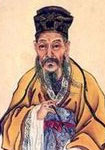“绛纬动秋怀”的意思及全诗出处和翻译赏析
诗词类型:
《新秋雨夜西斋文会》梅尧臣 翻译、赏析和诗意
《新秋雨夜西斋文会》是宋代梅尧臣创作的一首诗词。下面是诗词的中文译文、诗意和赏析:
中文译文:
夜幕蔽天,阴霾密布,灯光昏暗中,客斋静静地谢绝了宾客。梧桐树生长在寂静中,引发我深深的思考;纱帘微动,引发我对秋天的思念。我不愿意喝得醉醺醺,只想小酌一番;清新的言谈使我愉悦,不觉得厌倦。但是,谁会关心作为官员的我,我在孤寂的阶梯上吟唱,表达着我内心的苦闷和怨愤。
诗意和赏析:
这首诗词以秋天的夜晚为背景,表达了诗人梅尧臣在阴暗的夜色中感受到的孤寂和忧愁。整首诗词通过对客斋、梧桐树、纱帘、饮酒和言谈等元素的描绘,展现了诗人内心的情感和思考。
诗词开篇以夜幕蔽天、阴霾密布的景象,烘托出一种沉闷和压抑的氛围。客斋灯光昏暗,谢绝了宾客,使得诗人感到孤独和寂寞。接着,诗人描述了梧桐树的生长和纱帘微动,表达了他内心的思考和对秋天的思念。梧桐树生长在寂静中,可能引发诗人对生命和人生的思考,而纱帘的微动则象征着秋天的到来,进一步唤起了诗人对秋天的情感和回忆。
在这样的夜晚,诗人不愿意喝得醉醺醺,只想小酌一番。这表现了诗人对于安静和淡雅的追求,也折射出他对于人生的态度。清新的言谈使诗人感到愉悦,不觉得厌倦。这种清言谈可能是指与志同道合的朋友交流,或者是与自己内心对话的方式,使诗人得到一种宣泄和抚慰。
最后两句表达了诗人的苦闷和怨愤。诗人自称“何水部”,指的是他作为官员的身份,但却感受到了孤独和被忽视的痛苦。他在空阶上吟唱,寄托了他内心的苦闷和怨愤,同时也显露出对于社会的不满和对命运的抱怨。
总体来说,这首诗词以细腻的笔触描绘了一个秋天夜晚的景象,通过对客斋、梧桐树、纱帘、饮酒和言谈等元素的描绘,展现了诗人内心的情感和思考。诗人表达了对孤独和寂寞的感受,对秋天的思念,对清新的言谈的愉悦,以及对社会和命运的不满和怨愤《新秋雨夜西斋文会》is a poem written by Mei Yaochen during the Song dynasty. Here is the Chinese translation of the poem, followed by an analysis of its meaning and appreciation:
Translation:
Amidst the dark night, obscured by haze,
The lamp's dim light fades in the western studio, bidding farewell to guests.
The parasol tree grows in silence, inspiring contemplation,
The crimson silk stirs, evoking autumn's sentiments.
I prefer a modest drink, not seeking intoxication,
Clear words bring harmonious joy, never tiresome.
Who will sympathize with this humble Water Bureau official,
Singing bitter complaints alone on empty steps?
Meaning and Analysis:
This poem portrays the sense of solitude and melancholy experienced by the poet, Mei Yaochen, on an autumn night. Through the depiction of various elements such as the guest studio, the parasol tree, the moving silk curtain, and the act of drinking and conversing, the poet reveals his inner emotions and contemplation.
The poem begins with a description of the night sky covered by darkness and haze, creating a gloomy and oppressive atmosphere. The dim light of the lamp in the guest studio suggests the poet's feelings of loneliness and solitude. Next, Mei Yaochen describes the growth of the parasol tree and the slight movement of the silk curtain, expressing his contemplation and longing for autumn. The parasol tree growing in silence may trigger the poet's reflections on life and existence, while the movement of the silk curtain symbolizes the arrival of autumn, further stirring the poet's emotions and memories associated with the season.
On such a night, the poet prefers a modest drink instead of getting drunk. This indicates his pursuit of tranquility and elegance and reflects his attitude towards life. The pleasure derived from clear and harmonious conversation brings the poet joy that never becomes tiresome. This could refer to the poet engaging in conversations with like-minded friends or engaging in inner dialogue as a means of catharsis and solace.
The last two lines express the poet's bitterness and resentment. The poet refers to himself as "this humble Water Bureau official," highlighting his identity as a government official who feels the pain of loneliness and neglect. By singing bitter complaints alone on empty steps, the poet expresses his inner anguish and grievances, while also revealing his discontent with society and fate.
Overall, this poem delicately depicts an autumn night scene. Through the portrayal of the guest studio, the parasol tree, the silk curtain, drinking, and conversation, the poet reveals his inner emotions and contemplation. Mei Yaochen expresses his feelings of solitude and loneliness, longing for autumn, the joy derived from clear conversation, as well as his dissatisfaction and resentment towards society and fate.
《新秋雨夜西斋文会》梅尧臣 拼音读音参考
xīn qiū yǔ yè xī zhāi wén huì
新秋雨夜西斋文会
yè sè jì yīn mái, dēng qīng xiè kè zhāi.
夜色际阴霾,灯青谢客斋。
wú tóng shēng jìng sī, jiàng wěi dòng qiū huái.
梧桐生静思,绛纬动秋怀。
xiǎo zhuó níng cí zuì, qīng yán bù yàn xié.
小酌宁辞醉,清言不厌谐。
shuí lián hé shuǐ bù, yín kǔ yuàn kōng jiē.
谁怜何水部,吟苦怨空阶。
“绛纬动秋怀”平仄韵脚
拼音:jiàng wěi dòng qiū huái
平仄:仄仄仄平平
韵脚:(平韵) 上平九佳
